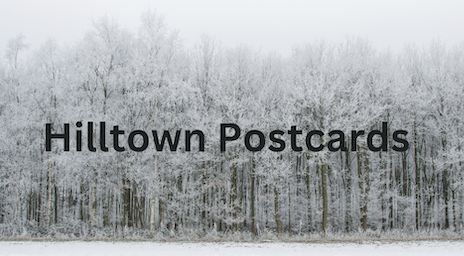We took the kids for pancakes at the Red Bucket Sugar Shack on the far end of a paved road in Worthington. It was a charmingly rustic place with long picnic benches and crushed stone on the floor. Red wooden buckets were hung from the maple trees along the road, for show only because no one serious about sugaring used them anymore.
The sugarer, Jeff, a tall, red-headed man who looked more like a cowboy than someone who boiled syrup, tapped the trees in his sugar bush and elsewhere, collecting the clear sap that ran through plastic tubing to a metal vat. He trucked the sap back to his sugarhouse to boil it down into syrup in a large, flat-panned evaporator that billowed steam, slightly sweet and pleasant.
Sugaring meant early spring although, as we found, winter hadn’t given up. The days rose into the forties, but the nights fell below freezing. It was worrisome to us, because we were down to our last bit of firewood at our home. But that’s the temps the sugarers need so the maple trees don’t bud and end the season’s draw. It still snowed, but it was the wet kind that melted the next day. Poor man’s fertilizer, I heard it called.
Now, feeling the change in the weather and a good breakfast out, we were ready for a drive around town. The trees were bare still. Snow lingered in the woods and in dirty drifts along the roads where the plow’s blade shoved it. But the light was stronger and the air had a different scent, something green and fresh.
Zack, Win’s father, promised to put us on his list of people who get fiddleheads later in the spring. The old man had his secret spot beside a river in Huntington. We ate fiddleheads before, but store-bought. The tightly coiled fronds were a little like asparagus although I parboiled them twice to cut the tonic taste.
Hank decided to take Indian Oven Road, named that because of a rock formation in the middle of this winding dirt way that must have looked like an oven to someone long ago. If any Indians were there, however, they were just passing through.
Not many houses were on this road, newer homes, of course, at either end, and a few hunting camps in the middle. Hank discovered it last fall and it saved a few miles getting from one main paved road to another so it was a bona fide shortcut except in the winter when the town did not plow.
The last big storm was a month ago so it should be clear, but as we rounded the first curve, the road’s surface ahead appeared wet and loose. Mud. The other early spring phenomena.
“This doesn’t look too good, Hank. Maybe we should turn back,” I told him.
But Hank kept going.
“We’ll be okay. Just relax.”
But we weren’t okay, because we only went a few yards before our VW bus sunk into mud. The tires spun but couldn’t catch anything hard enough to move forward or backward. Hank put the van in neutral. I closed my eyes.
We were stuck, really stuck.
I got the kids out of the VW as if four skinny kids would lessen its weight and asked them stay on the bank. They watched as I pushed the front.
Hank should be doing this, but I didn’t know how to drive stick. He had the VW in reverse, giving it a little gas, but it was useless. It was digging itself deeper.
I yelled for him to stop. No way was this going to work.
Hank lit a cigarette. He smoked then. His jaw was tight as he got out to check the van. Mud was halfway up the wheels. He shook his head and glanced at a log cabin a hundred yards back, built smartly where the road was firm.
A man came out. We didn’t know him, we were still new to town, and he scowled as he looked our way. Hank tossed the butt into the mud, then walked toward him.
The man Hank was talking with didn’t appear willing to give us a hand. But Dan came, reluctant, complaining about the people who didn’t have any common sense driving on a dirt road during mud season and how tired he was pulling them out.
Then, Dan saw our kids standing on the side of the road, looking a little scared about getting home, and his face softened. He had two daughters of his own. He wasn’t an unreasonable man, just an inconvenienced one.
He went to get a chain and his truck. He thought he could get us out, but Hank would have to be careful so he didn’t dent his truck’s grill when he towed us. The rescue was a success thanks to Dan, who I am glad to say later became a family friend.
And we rookie newcomers learned another lesson about country living that day.

